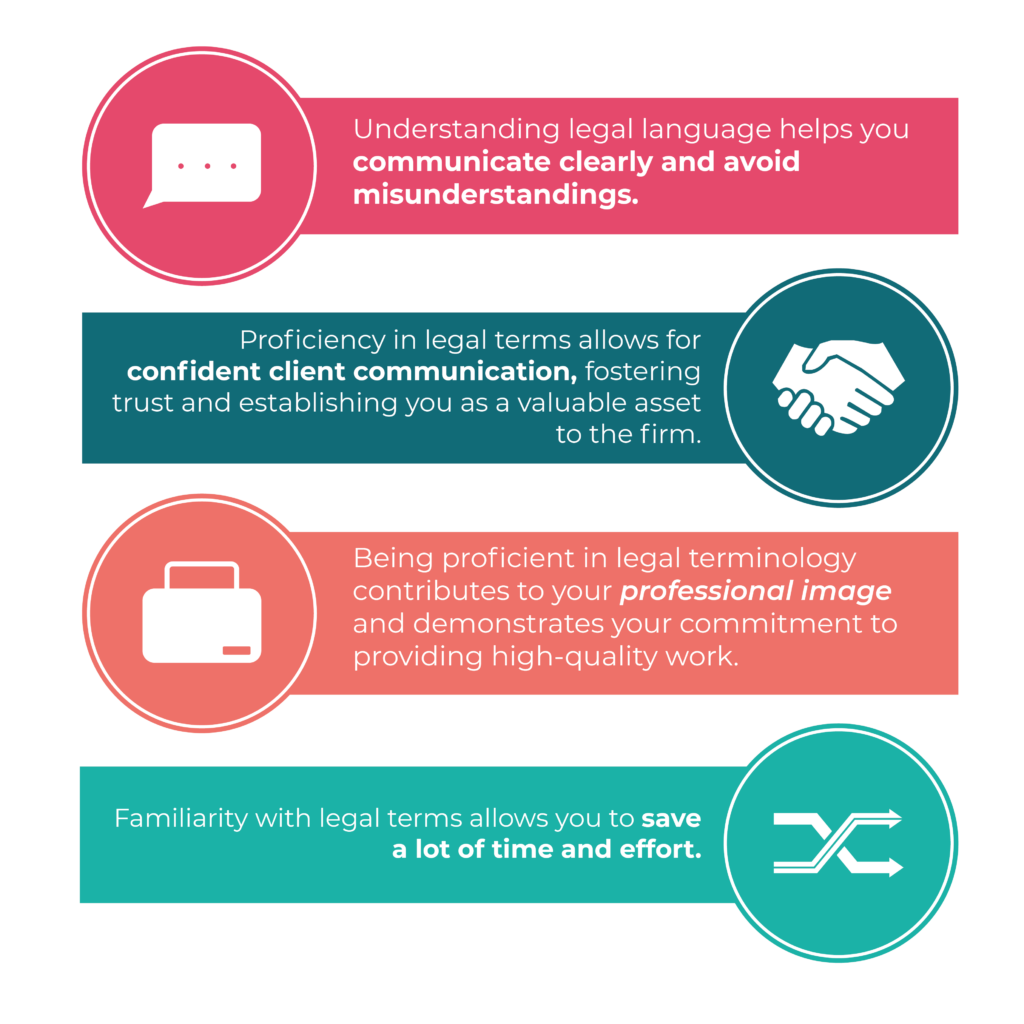
Job Duck is a staffing company that helps incredible people build an amazing career. As you may know, the majority of our clients are law firms based in the United States.
Whether you decide to apply for the Virtual Receptionist position or the Virtual Marketing Assistant position, it’s crucial to familiarize yourself with legal terms.
In this blog post, we will explain how becoming familiar with these terms can be beneficial and share some of the most popular specialized terms used by law offices. Enjoy the read!
Benefits of Learning Legal Terminology
Legal offices use their own special language, and not everyone understands the words they use. Some of these words might sound familiar, but they can have completely different meanings in the context of the law. Learning legal terminology can be beneficial for several reasons:

Most Common Legal Terminologies
Jurisdiction:
- The authority granted to a court to hear and decide a case.
- “The court has jurisdiction over the case.”
Plaintiff:
- The party who initiates a legal action or lawsuit against another party (the defendant).
- ”The plaintiff filed a lawsuit against the company for breach of contract.”
Defendant:
- The party against whom a legal action or lawsuit is brought by the plaintiff.
- ”The defendant asserted their innocence and pleaded not guilty.”
Trial:
- A formal legal proceeding in which evidence is presented and a judge or jury decides on the issues in dispute.
- ”The trial commenced with the presentation of opening statements by the attorneys.”
Verdict:
- The decision reached by a judge or jury at the conclusion of a trial, determining whether the defendant is guilty or not guilty.
- ”After careful deliberation, the jury reached a unanimous verdict of guilty.”
Civil Law:
- The body of law that deals with private rights and remedies, such as disputes between individuals or organizations.
- ”The dispute between the neighbors was resolved through civil law proceedings.”
Criminal Law:
- The body of law that deals with crimes and their prosecution, involving offenses against the state or society.
- ”The accused was charged with robbery under criminal law.”
Evidence:
- Information, objects, or testimony presented in court to prove or disprove facts relevant to a case.
- ”The DNA evidence presented by the prosecution proved crucial in convicting the defendant.”
Appeal:
- A request for a higher court to review the decision of a lower court, usually based on claims of legal error or injustice.
- ”The convicted defendant decided to file an appeal seeking a reversal of the verdict.”
Statute:
- A written law enacted by a legislative body, such as a federal or state government, which sets forth specific rules and regulations.
- ”The new statute imposed stricter penalties for traffic violations.”
These terms represent a small fraction of legal terminology, but they are among the most common and widely used in the field of law. Click HERE to find more legal terms!
As we mentioned earlier, we are a staffing company that helps incredible people build amazing careers working from home for a United States-based business. Do you match our core values and the other requirements? Do not hesitate to apply now by clicking HERE.
Until next time,
The Job Duck Team




6 Comments
That’s right, this article is very good. Personally, I think it helps a lot to enrich skills as a forensic psychology student. I know I’m going to need them in the reports. thanks for sharing regards
How can I start whit my aplicación